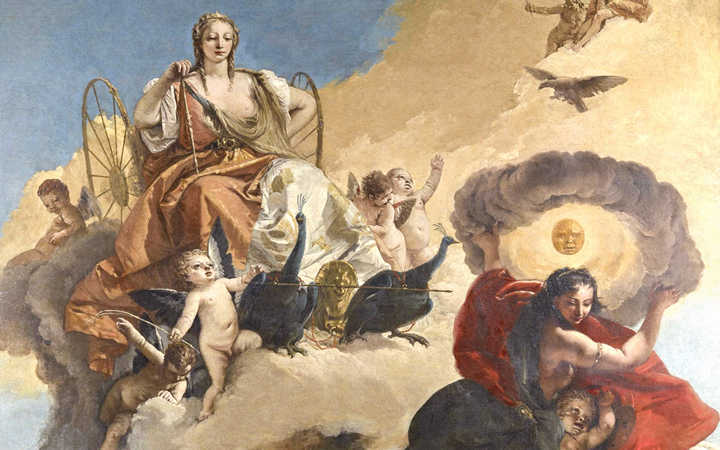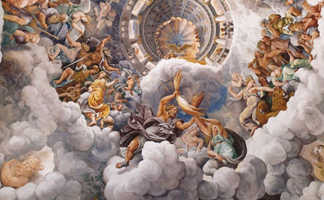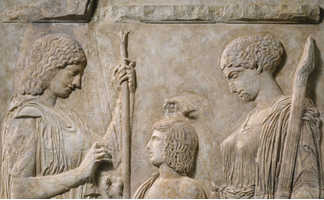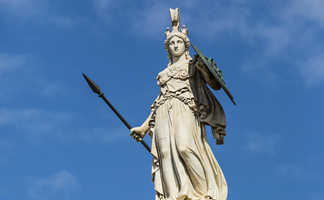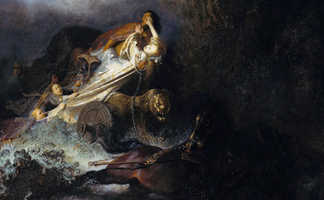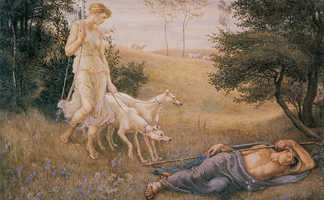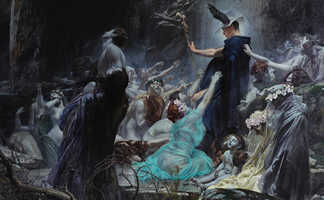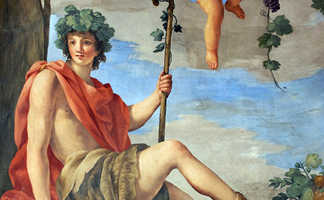It may seem a little strange that the goddess associated with hearth and home, as well as with aiding women during childbirth, would have such a disruptive married life, but that’s just an honest reflection of many (but, thankfully, not all) human marriages and it is consistent with the ancient Greek tradition of worshipping flawed deities with whom the average person can identify and, therefore, not feel terrorized by.
Hera is also known as the Queen of the gods and the sky goddess. She is almost certainly derived from much earlier Middle-Eastern fertility goddesses such as Egypt’s Isis and the Canaanite’s Astarte. She is the presiding deity during marriage ceremonies. Animals associated with Hera include the cow, the cuckoo, and the peacock. The peacock was a relatively late innovation, as the bird was not familiar to Greeks until the conquests of Alexander near the end of the fourth century, BC. Most depictions have her wearing a diadem or crown, and holding a lotus-topped scepter. Daughter of the Titans Cronus and Rhea, she was also the sister of Zeus.
However, when one gets into the details of Hera’s activities, she is seen as primarily acting out her white-hot rage at Zeus and his various extramarital companions. It didn’t matter how innocent the women were, Hera went after them all, even persecuting their offspring. When Aphrodite became pregnant by Zeus, Hera laid hands of the as yet to be born Priapus and made him exceedingly ugly. She also gave him permanent erectile dysfunction, which gave rise to several humorous myths concerning his attempted sexual exploits failing at the critical moment.
She prevented Leto, whom Zeus seduced as a swan, from giving birth, she tortured Heracles (the product of Zeus and Alceme), throughout his life, beginning with the two vipers infant Heracles strangled in his crib. When Zeus seduced the mortal girl Aegina, Hera threw snakes into the waters off the island of Oenone, where Zeus had sequestered her, poisoning the entire island just to get one girl. When Zeus fell in love with Io, a priestess of Hera, Hera turned her into a cow. When Io was finally allowed to resume her human form after wandering around as a cow, and gave birth, Hera engineered the child’s kidnapping. Stories of Hera exacting revenge on Zeus’s lovers number in the dozens.
Hera was also spiteful to other people for their lack of piety, or in reaction to perceived slights. She blinded Teiresias, a seer, because he took Zeus’s side in an argument. She supported the Greeks during the Trojan War because she was sore at the decision of the Trojan, Paris, to choose Aphrodite over Hera and Athena as the most beautiful goddess. There are many stories of Hera punishing mortals for not respecting her or worshipping her properly.
Hera was constantly leaving Zeus due to his numerous infidelities. The best-known instance has Hera going off to the island of Evia, where she had been raised. Zeus tried everything to get her back, and finally ended up seeking the counsel of one Cithaeron, king of Plataea, who advised him to fabricate a wooden statue, dress in a bridal gown, and announce that he is about to marry her. Hera, who could never resist tormenting Zeus’s girlfriends, hurried to the wedding and, upon discovering Zeus’s ruse, reconciled with him out of relief that he wasn’t actually marrying someone.
Hera has a starring role throughout the Iliad. Her hatred of the Trojans was purely personal. As mentioned, Paris chose Aphrodite over Hera as the most beautiful goddess. Hera then declares that all Trojans have to be destroyed, and convinces Athena to help the Greek forces. Later on, Hera and Athena thwart Ares, god of war, who has sided with the Trojans. She enlists the aid of Poseidon, who convinces the Greeks to keep fighting. When Zeus decrees that the gods were not to interfere in the Trojan conflict, Hera, in the section of the Iliad known as The Deception of Zeus, seduces her husband, and with the help of Hypnos, god of sleep, causes Zeus to fall into a deep, prolonged slumber, freeing Hera to aid the Greeks without fear of punishment.
In a relatively rare positive role, Hera was the protectress of Jason in the tale of his voyage with the Argonauts.
Most festivals in ancient Greece celebrating Hera usually celebrated the institution of marriage and had as their focus the marriage ceremony of Hera and Zeus. Dances and ceremonies were performed by young married women. Temples dedicated to Hera were known as the Heraion.
In Argos, Greece’s oldest city, the priestess of Hera was carried to the Heraion in an oxen drawn cart. It was a new year’s festival, during which males just coming of age were introduced as new citizens to the public.
In Plataia, 30km northwest of Athens, the festival of Hera was known at the Daedala, and was a celebration of reconciliation between Hera and Zeus. In this fire festival a puppet was fashioned, given the name of Hera, drawn by oxen on a cart after being washed in the local river, and then burned along with other idols.
On the island of Samos, Hera’s festival was a celebration of fertility, and included initiation rites of boys and girls into adulthood. A primitive wooden cult image of Hera was paraded on a plank to the sea and back. In Corinth, a version of Hera known as Hera-Acraea (“of the heights”) was the protector of that city’s castle high up on the Acrocorinthos above the city.
In Athens, the marriage of Zeus and Hera was celebrated in late winter during the month of Gamelion (“wedding feast”), approximately corresponding with February and the traditional month of marriage in ancient Greece.
In Olympia, during the festival known as the Heraia, young virgin women competed in a foot race every four years. As elsewhere, an initiation rite celebrating the passage from youth to adulthood was part of the festival.
Temples to Hera are generally very old, with the Heraion in Perachora, near Corinth, being one of the oldest temples in Greece and dating from about 900 BC. The Heraion in Olympia dates fro 620 BC, as was that in Corfu. On Samos, the “new” Heraion dates from 525 BC.
Goddess worship is a common feature amongst ancient pagan peoples. As with their other deities, Greeks humanized Hera, making her very powerful, but also very understandable. Hera is an especially prickly goddess, and one around whom ancient Greeks had to tread very carefully.

